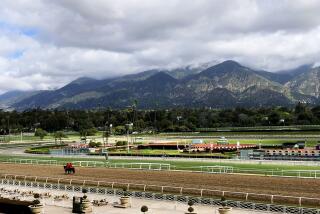Opposition to Racetrack Union Grows
Reversing field, the horse racing industry is mounting an attack against legislation to clean up poor labor and housing conditions for workers who take care of racehorses throughout California.
After initially expressing support for some of the bill’s provisions, the often fractious groups that make up the billion-dollar industry have united and begun lobbying against an Assembly bill scheduled to be heard in the Senate Appropriations Committee today.
“If the bill gets out of Appropriations today, there will be a major effort to defeat it when it hits the floor,” said Bob Fox, lobbyist for the California Thoroughbred Trainers.
Horse racing leaders have locked horns with the Service Employees International Union over provisions that could pave the way for so-called backstretch workers to unionize, and that would require their bosses to submit payroll records to the state labor commissioner for annual audits.
Horse trainers, who hire the stable hands, particularly are angered by a provision that would force them to form a single employer group for collective bargaining with unions. Currently, there are more than 800 trainers in the state, and union leaders said it would be overwhelming to try to bargain with each one to gain--at best--4,000 new workers as members.
The push to clean up the so-called backstretch areas in California followed a Times story in April that revealed substandard and unsanitary living conditions at some of the state’s nine fairgrounds and six major racetracks--including Santa Anita in Arcadia, Fairplex in Pomona and Golden Gate Fields, near Berkeley.
The story also documented complaints about deficient pay, as well as exemptions in labor law that have made stable hands the only workers in the state who can toil seven days a week, year-round, without overtime pay.
The stable hands also are excluded from the National Labor Relations Act and the state Agricultural Labor Relations Act. As such, there are no rules forbidding workers from being coerced or intimidated against joining a union, labor officials charged. And under current law, unions have no legal right to enter the backstretch areas to organize laborers on their own.
Once filled by whites and blacks from rural areas, the stables are now largely worked by men from Mexico and Central America. Grooms clean and feed the horses and prepare them for races, while hot-walkers cool them down after a run. They are licensed by the California Horse Racing Board, although a portion of the workers are reportedly illegal immigrants.
In June, labor inspectors launched surprise sweeps at four major racetracks and said they found violations of overtime, minimum wage and record-keeping laws. They are still conducting audits and plan to release a detailed report on their findings.
That same month, three Assemblymen--Herb Wesson (D-Culver City), Darrell Steinberg (D-Sacramento) and Alan Lowenthal (D-Long Beach)--co-authored the backstretch bill and are trying to iron out disputes between the industry and labor. But they said they were ready, if necessary, to push it through the Legislature without industry cooperation.
“I want to be sensitive to the fact that they operated for years totally different than every other industry,” Wesson said. “It will take a little more time and a little more education. We have to let them know that this is not Armageddon.”
Yet trainers warned that the bill could be a dire threat to the future of horse racing, which last year took in $3.8 billion in wagers. They said some horsemen are leaving the state and the industry could collapse in the resulting vacuum.
“I’m here to tell you that is absolutely true with regards to this issue,” Fox said.
Union leaders, meanwhile, said every industry makes the same complaint when forced to undergo change. Allen Davenport, lobbyist for the union, which already represents other racetrack employees, said the provisions are necessary because the backstretches are exempt from the labor acts that provide rules for unionizing.
Horse and track owners said they were not opposed to cleaning up the backstretches and ensuring that free on-site housing complied with health standards. But they are chafing under the measure’s provision to hand over payroll records and form the trainers group.
Those points have pushed the Thoroughbred Owners of California, led by former state Atty. Gen. John Van de Kamp, and the California Assn. of Thoroughbred Racetracks to join the opposition against the bill. They said the legislation essentially would shove a union down their throats and would not include measures to determine whether the workers wanted it.
Davenport defended the measures and said they have precedent in the home health care and janitorial industries.
“We’re just trying to set up a structure so this group of workers could be helped,” he said.
Steinberg, head of the Assembly Labor and Employment Committee, said the state’s attempt to clean up the backstretches is a test for regulating other larger industries, such as farming and construction.
“If the state can’t protect a very small group of workers, on a handful of facilities,” he said last week in a statement, “how can it protect the rights of workers throughout the state?”
More to Read
Go beyond the scoreboard
Get the latest on L.A.'s teams in the daily Sports Report newsletter.
You may occasionally receive promotional content from the Los Angeles Times.











